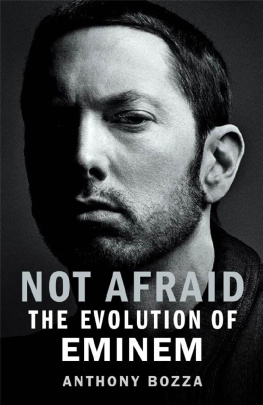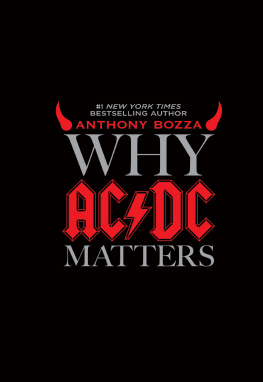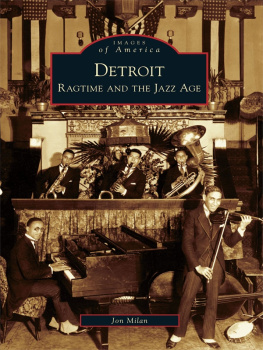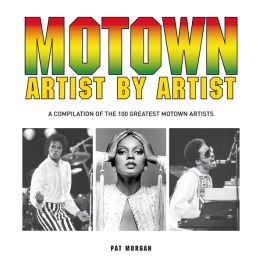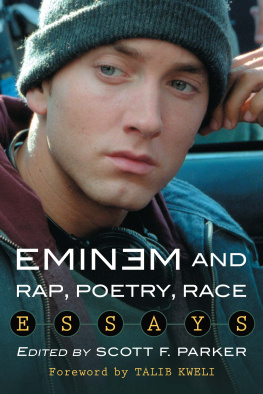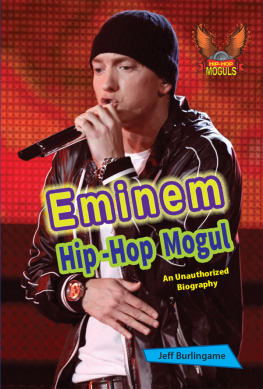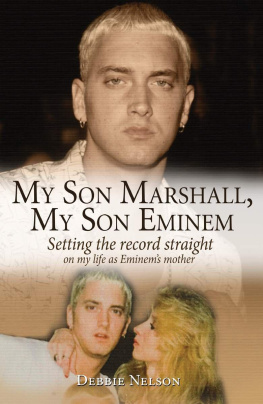NOT AFRAID
Also by Anthony Bozza:
Whatever You Say I Am: The Life and Times of Eminem
Why AC/DC Matters
Slash: It Seems Excessive, but That Doesnt Mean It Didnt Happen (with Slash)
Tommyland (with Tommy Lee)
Too Fat to Fish (with Artie Lange)
NOT AFRAID
THE EVOLUTION OF
EMINEM
ANTHONY BOZZA

Published by Blink Publishing
The Plaza,
535 Kings Road,
Chelsea Harbour,
London, SW10 0SZ
www.blinkpublishing.co.uk
facebook.com/blinkpublishing
twitter.com/blinkpublishing
Hardback 9781788701198
eBook 9781788701211
All rights reserved. No part of the publication may be reproduced, stored in a retrieval system, transmitted or circulated in any form or by any means, electronic, mechanical, photocopying, recording or otherwise, without prior permission in writing of the publisher.
A CIP catalogue of this book is available from the British Library.
Copyright Anthony Bozza, 2019
Anthony Bozza has asserted their moral right to be identified as the author of this Work in accordance with the Copyright, Designs and Patents Act 1988.
Every reasonable effort has been made to trace copyright holders of material reproduced in this book, but if any have been inadvertently overlooked the publishers would be glad to hear from them.
Blink Publishing is an imprint of Bonnier Books UK
www.bonnierbooks.co.uk
To my mother, who has loved and supported me, unwaveringly, for my entire life. I try my very best to make you proud. I love you with all my heart.
Contents
There are few artists in the history of hip-hop who have managed to establish a legacy, maintain their integrity, and achieve longevity. One of the true pioneers, LL Cool J, has reached commercial heights as a rapper, TV and film actor, label owner, and author and has done so consistently for over thirty years. In 2017, he became the first rapper to receive the Kennedy Center Honors for his lifetime contribution to American culture. LL was Marshall Matherss first childhood hero and inspiration; it was his music, before N.W.A, Naughty by Nature, and Onyx, that Marshall blasted in his Walkman as a teen walking down 8 Mile. Over the years, the two have formed a friendship of mutual respect. The following is an interview with LL Cool J exclusive to this book .
In 1998, I was in the studio experimenting with Dr. Dre on the song Zoom and quite a few other songs. When we took a break, he played me a few tracks by a kid named Marshall that he was producing. It was dope. I loved the sarcasm, the cockiness, the arrogance, the creativity, and all the shit talking. It really resonated with me in a strong way. There were a few lines that I thought were very good, but he had this oneHow can I be white, I dont even exist (Role Model). That one stayed with me.
When I first met Marshall, I ran that line by him, and I think it took him by surprise. I had no idea how much he was into my music growing up. I was glad to discover that hes a humble guy, that he saves it for the music, and that in person hes none of what he is on record. Weve met on quite a few occasions since then; weve talked and vibed, and we have a great friendship. Marshall is a real talented guy, a great writer; hes witty and willing to take risks, which is important if youre going to have a long career in this business.
If you do what we do and you get that break and become a successful artist, you go through the honeymoon phase. At that point youre so popular and the public is so in love with you that you can take a shit on a fucking cookie, and everybody will love it. Enjoy that, because after the honeymoon is over, you actually have to stand up and make something that tastes good. That was the true test, and Marshall passed it.
When I look at what it means to be a true artist, its not about the first five, seven, or even ten years. To me, its what youre doing after that, if youre doing anything at all. The biggest challenge is to not be above it all, to keep caring if youre successful. Hip-hop is funny because the more successful you become, the less people think you care about the art itself, especially if you start to display the trappings of success. In hip-hop, present-day success can cannibalize your future success. Let me be specific with you: if youre purely living in hip-hop culture, you wont have an issue. But if youre successful in rap music and dont continue to live in hip-hop culture, youll run into trouble. Subconsciously, hip-hop fans recognize this when they see it because hip-hop is an attitude; its a mind-set, and its a way of life. KRS-One said it best when he said, Rap is something you do; hip-hop is something you live. If youre successful and continue to live within hip-hop culture, youll be fine. Step too far outside of where youre from, and youll definitely get spanked.
Em has done a good job of staying close to what he is and what he believes in. He hasnt deviated from who he is, and hes made some creative choices as a rapper. Hes ventured outside his base, but hes always circled back. Hes had the normal ups and downs of any post-honeymoon phase rapper and come out fine. Hes still doing big shows and touring the world. Hes got a real career, and you gotta respect that. Hes never followed, and hes trusted his own creative voice and vision; those are the keys. When the metric for success is your love for the project and the inspiration it creates, for others as well as for you, then youre in good shape. When you start paying too much attention to what people are writing or saying about you or your sales or streams, youre in trouble. At that point youre not an artist. Youre a song maker; youre a hack. Its better to be an artist who hasnt sold a million but is supremely respected by your peers. If you get both of those things, great, but its about being true to your art. Do that, and believe methe rest follows.
Em got both.
But we cant ignore the level that his career has gone to simply because hes white. There are certain states in America, media organizations, corporate sponsors, and doors that are opened for him because of his skin color. Those doors were not and will not be opened for me or other black artists. Its not everybody, but certain organizations feel a certain way about black artists that they dont about white ones. This isnt new, and it hasnt changed.
When Run-DMC, Beastie Boys, and I were all coming up together, Beastie Boys were being played on radio stations that wouldnt even consider playing my stuff even if it was the same shit. And in some ways, it was because we were all on the same label and Rick Rubin produced all of us! Em can attribute a great portion of his successthe more commercial side of what hes doneto that little extra turbo boost he gets from being white.
That being said, it would be unfair to even suggest that his color is the only reason hes successful and that he has no talent. Its nothing for black artists to be bitter about because that can disturb your creativity, which goes against everything I believe in. But if we didnt recognize it, we would all be liars.
Put it this way: look at Jay-Z and the great things hes done. But what if he was white? Trump had something to say to Snoop; he didnt have shit to say to Emprobably because he knows that fanbase is a lot of who votes for him. America is my home, but it is funny here, man. Em has opened doors for more artists, and he has expanded the genre of hip-hop and taken it to new heights. But its kinda like Motown. All of white America knew about Motown, but they didnt go out of their way to support the individual artists. It took Michael Jackson thirty years to reach those heights! He started at eight years old and had to be the most talented motherfucker in the world to do it.
Next page
